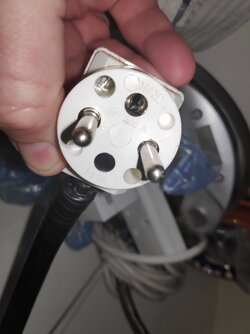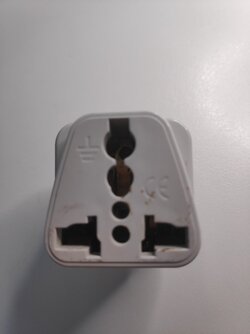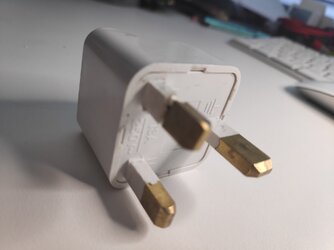- Jun 3, 2022
- 4
- 1
- 33
- If you're a qualified, trainee, or retired electrician - Which country is it that your work will be / is / was aimed at?
- Ireland
- What type of forum member are you?
- DIY or Homeowner (Perhaps seeking pro advice, or an electrician)
Hello,
I'm seeking some advice on an overheating plug adaptor please. Complete amateur so please forgive any errors in calcs / assumptions / terminology. I've recently started using with an expresso machine in an Irish domestic environment (ultimately 230V 13A socket) but it comes with a two-pin plug type that I've attached in pic 1, which has 16 / 250 printed on it, I'm guessing rated to 16A / 250V. The machine "Total Power" is listed as 3.15kW and running at 230V (it also supports 400V in another configuration that is not in use). I'm assuming at 230V, 3.15kW requires max 13.7A. The machine takes about 15min to initially warm-up and thereafter turns on to reheat probably 1 minute every 10-15 minutes. I was using a 2 pin to 3 pin adaptor (pic 2) with it but noticed one of the pins slightly burned (pic 3). The adaptor is rated for 13A but I guess the machine pulls too high a current for too long a time resulting in the heat build-up. Is there an adaptor on the market that would better suit this purpose or would I be better off cutting off the existing plug and wiring the machine to a standard 13-amp 3-pin plug? If I did cut the plug (there's no warranty involved, old second-hand machine) and found there was no earth wire (I'm unsure of the standard of the original plug - it doesn't seem to be the schuko grounded plug type with the earth on the edge, though it does have what looks like a receiver for a earth pin in the earth pin position on a UK mains plug), would it be reasonable to assume the machine is double-insulated and doesn't require the earth pin connected or am I way off. The machine is configured in a cut-down (less heating elements connected) capacity which is apparently intended to be run on a 230V supply.
Grateful for any advice.
Kind regards,
Jim.
I'm seeking some advice on an overheating plug adaptor please. Complete amateur so please forgive any errors in calcs / assumptions / terminology. I've recently started using with an expresso machine in an Irish domestic environment (ultimately 230V 13A socket) but it comes with a two-pin plug type that I've attached in pic 1, which has 16 / 250 printed on it, I'm guessing rated to 16A / 250V. The machine "Total Power" is listed as 3.15kW and running at 230V (it also supports 400V in another configuration that is not in use). I'm assuming at 230V, 3.15kW requires max 13.7A. The machine takes about 15min to initially warm-up and thereafter turns on to reheat probably 1 minute every 10-15 minutes. I was using a 2 pin to 3 pin adaptor (pic 2) with it but noticed one of the pins slightly burned (pic 3). The adaptor is rated for 13A but I guess the machine pulls too high a current for too long a time resulting in the heat build-up. Is there an adaptor on the market that would better suit this purpose or would I be better off cutting off the existing plug and wiring the machine to a standard 13-amp 3-pin plug? If I did cut the plug (there's no warranty involved, old second-hand machine) and found there was no earth wire (I'm unsure of the standard of the original plug - it doesn't seem to be the schuko grounded plug type with the earth on the edge, though it does have what looks like a receiver for a earth pin in the earth pin position on a UK mains plug), would it be reasonable to assume the machine is double-insulated and doesn't require the earth pin connected or am I way off. The machine is configured in a cut-down (less heating elements connected) capacity which is apparently intended to be run on a 230V supply.
Grateful for any advice.
Kind regards,
Jim.
- TL;DR
- 2 pin adaptor burned pin, new adaptor or replace plug











